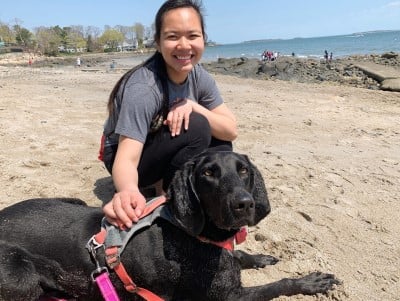 Meet Michelle Mosqueda, a PhD student in the Massi Lab. Michelle studies how protein function and dynamics are affected by mutations involved in neurodegenerative diseases such as Amyotrophic lateral sclerosis or ALS. In addition to her research, Michelle is an active member of the Initiative for Maximizing Student Development (IMSD) Committee; member of the BMP Diversity Action Committee; publicity coordinator of “Life After the PhD” initiative; part of the Diversity Interest Group (DIG), and elected treasurer for the Society for the Advancement of Chicanos and Native Americans in Science (SACNAS) at UMass Chan Medical School. We asked Michelle a few questions about her journey through science, and as part of the BMP department, so everyone has a chance to know more about her.
Meet Michelle Mosqueda, a PhD student in the Massi Lab. Michelle studies how protein function and dynamics are affected by mutations involved in neurodegenerative diseases such as Amyotrophic lateral sclerosis or ALS. In addition to her research, Michelle is an active member of the Initiative for Maximizing Student Development (IMSD) Committee; member of the BMP Diversity Action Committee; publicity coordinator of “Life After the PhD” initiative; part of the Diversity Interest Group (DIG), and elected treasurer for the Society for the Advancement of Chicanos and Native Americans in Science (SACNAS) at UMass Chan Medical School. We asked Michelle a few questions about her journey through science, and as part of the BMP department, so everyone has a chance to know more about her.
What set you on this trajectory of becoming a scientist?
I started my scientific journey as part of the Pathway to Graduate School (PGSP) program, where I first experienced doing bench work and working with other lab members for a publication.
What led you to your current field?
During the Foundations course in my 1st year, we took a short module about Structural biology that I greatly enjoyed. When I was looking for lab rotations, I talked to some professors in the BMP department and ended up rotating in the labs of Dr. Celia Schiffer and Dr. Francesca Massi.
How would you describe your research?
My research aims to elucidate how ALS-linked mutations in Profilin-1 can alter the allosteric communication between its two binding sites through changes in protein dynamics. Characterizing these changes can inform us how the process of actin polymerization is impacted by the ALS-linked mutations.
How does your research apply to the broader world?
Analyzing how these mutations affect the internal dynamics of cytoskeletal-modeling proteins such as Profilin-1 will advance the understanding in the ALS field and help develop better therapeutic options to treat ALS and other neurodegenerative diseases.
Why is your research important?
There has been a lot of work done to understand the mechanisms of ALS in the past 30 years, however, there is still no cure for ALS. More research needs to be done to further understand the complicated disease mechanisms of ALS.
What is the coolest thing about your research?
For my research, I will be utilizing molecular dynamics (MD) simulations which allows me to observe “dancing” molecules as they interact with different ligands.
What is one thing you would like to achieve with your research?
I hope that my research can one day inform better therapeutics for neurodegenerative diseases such as ALS.
Why did you choose this lab/department at UMass Chan?
Everyone in the BMP department is welcoming and genuinely offers help when needed. I chose this department because being here feels like being a part of a family.
Were there any setbacks to your trajectory? How did you overcome them?
The biggest setback that I had to overcome was feeling like I am not good enough to become a scientist because of my inexperience. As someone who suffered from and still suffers from imposter syndrome from time to time, having the support of students and mentors around me greatly helped in realizing my potential and moving forward to reach my goals.
What do you want members of the BMP to know about you?
I was not a big fan of dogs before (in fact I was scared of them!) until I got my own dog, Skylar, from a rescue in 2019.
What do you like to do when you are not doing research?
I enjoy cooking and going on hikes with my dog. I also enjoy dancing, yoga and attending Pilates class.
What are some of the lessons you learned along the way that you would like to share with trainees who recently joined the BMP department?
Never hesitate to ask for help!
Any advice you wished you had gotten when you first started as a scientist?
In graduate school, it can be easy to neglect oneself due to our workload. One thing that I wish I had learned sooner is creating a work-life balance that works for my needs.
What role do you think scientists play in helping to solve some of the current issues we face as a society?
In this time of the Covid-19 pandemic, scientists have been playing a huge role in preventing the spread of the disease by working on optimizing vaccines and other therapeutic options.
Where do you see yourself in 5 years?
In five years, I wish to be a computational research scientist focused on drug design and treatment. With the training and mentorship from the BMP department, I know this goal is possible.
One thing you would say to your younger self.
Do not put limitations on yourself. We are always capable of doing much more than we think we are capable of.